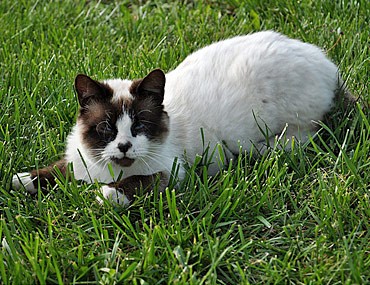Overview
A bite wound abcess is a fairly common occurrence, especially with cats who go outdoors. An abscess results when bacteria invade and infect a cut, scrape, or bite that a cat has received in the course of fighting with another cat or other animal.
Risk
Cats that spend time outdoors are at greater risk for developing an abscess because of their exposure to other cats. When a cat is bitten by another cat, the area can abscess quickly. Additionally, a bite wound can expose your cat to contagious diseases called retroviruses from other cats. The most common retroviruses are feline leukemia virus (FeLV) and feline immunodeficiency virus (FIV). Both viruses cause serious fatal diseases and are easily transmitted through bite wounds. Kittytest.com is a great resource to learn more about these diseases and how you can keep yourself healthy.
Symptoms The area may become swollen, be sensitive to the touch, and develop a bad odor; also, there may be a discharge of pus from the site. Your cat may stop eating, or may act lethargic or depressed, which are all signs of fever.
The area may become swollen, be sensitive to the touch, and develop a bad odor; also, there may be a discharge of pus from the site. Your cat may stop eating, or may act lethargic or depressed, which are all signs of fever.
Diagnosis/Treatment
Abscesses can be very serious if left untreated. The abscess must be lanced, drained, and cleaned and, because an abscess is an infection, your cat may need antibiotics and pain-relief medications.
Additionally, your veterinarian may want to test your cat for feline leukemia virus and feline immunodeficiency virus—since both of these viruses are transmitted from cat to cat and are highly contagious.
If your cat must undergo general anesthesia to have the abscess drained and cleaned, your veterinarian may also recommend preanesthetic tests to ensure your pet is healthy and can tolerate the anesthetic procedure.
These may include:
- Chemistry tests to evaluate kidney, liver, and pancreatic function, as well as sugar levels
- A complete blood count (CBC) to rule out blood-related conditions
- Electrolyte tests to ensure your cat isn’t dehydrated or suffering from an electrolyte imbalance
- An FeLV test to identify if your cat has feline leukemia
- An FIV test to identify if your cat has contracted the feline immunodeficiency virus
- Cardiac tests to rule out heart-related issues
Prevention
The best way to prevent your cat from getting abscesses is to check him daily for wounds, especially around the neck and head area, where cats have difficulty grooming. If you notice a cut or wound, contact your veterinarian staff so they can advise you regarding the best treatment for your feline friend.
If you have any questions or concerns, you should always visit or call your veterinarian – they are your best resource to ensure the health and well-being of your pets.
